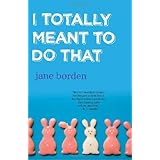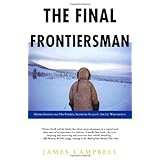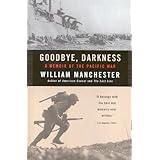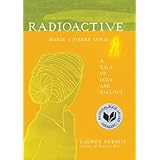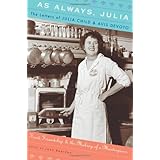
Average Reviews:

(More customer reviews)Are you looking to buy
As Always, Julia: The Letters of Julia Child and Avis DeVoto? Here is the right place to find the great deals. we can offer
discounts of up to 90% on
As Always, Julia: The Letters of Julia Child and Avis DeVoto. Check out the link below:
>> Click Here to See Compare Prices and Get the Best Offers
As Always, Julia: The Letters of Julia Child and Avis DeVoto ReviewIt's easy to recommend this book to dedicated foodies, and certainly to fans of Julia Child. "As Always, Julia" is the collection of the correspondence between Julia Child and her friend, mentor, and editor Avis DeVoto, from the time in 1952 when Julia wrote a fan letter to Avis' husband (regarding an article he'd written about kitchen knives) and mentioned in-passing that she was working on a cookbook, until the time several years later that the cookbook finally was published.
If you're interested in Julia Child the person (and My Life in France wasn't enough for you, whether or not accompanied by the Julie & Julia movie), then "As Always, Julia" is a no-brainer, because these were the letters shared by two intelligent and opinionated women who were confiding in one another, not talking to a microphone. And confide they did: about Avis' child-raising and Paul Child's job as well as the difficulty of finding fresh shallots. It is, more than anything else, the story of a real life friendship, and better than any epistolary novel you can imagine. You will know these women well, at their most personal, such as Avis writing, "I like every part about growing older except what happens to your feet." (It's hard to imagine anyone compiling such a collection now, with all of us writing e-mail -- if that -- and only packrats like myself keeping copies of everything for decades.)
But the book is interesting for several other reasons.
Watching the creation of a masterpiece: Mastering the Art of French Cooking was an instant classic, and it was the result of years of hard work. But the words "it was the result of years of hard work" does not begin to capture the number of cooking experiments Julia (and Simca) did, or contract negotiations, or research into the equipment that Julia could expect a typical American housewife to own. She experimented with pressure cookers, for instance, to find out if they were okay for making chicken or duck stock. "First time the [pressure cooker] brew was so horrible I threw it away." Then, after adding the vegetables only at the end, "Again it was loathsome so I threw it out." Many ducks gave their lives for such research, and the Childs often found themselves "bilious" after all these experiments.
Would-be writers (or any creator waiting for her ship to come in) may be heartened or inspired by the knowledge that even Julia had self-doubts. She wrote in 1953, "There is so much that has been written, by people so much more professional than I, that I wonder what in the hell I am presuming to do, anyway."
A snapshot of foodie history: My mother was never excited about cooking, and I don't think she owned a copy of MtAoFC. But I do remember shopping for groceries in the 1960s and early 1970s, when cookbooks had to give detailed explanations about what cilantro is, or how to make your own coconut milk. It was worse in the 1950s, and much of the Avis-Julia correspondence is about what was (or usually wasn't) available, from decent jarred chives to fresh clams anywhere but the coastal cities. They also debated the wisdom of getting those newfangled dishwashers, Waring blenders, and other devices that, they started out agreeing, nobody really needed.
A "daily history" of the McCarthy era: Nowadays, we tend to think of the time when Senator McCarthy held sway as a bizarre interlude in American history, but few of us remember it personally. Julia and Avis were extremely political women; one constant theme in their letters was the current political landscape, which they actively abhorred, and their letters become a chronicle of living through that time. "Oh god I wish this madness would subside, as I know it will, but it is exhausting watching all this go on," wrote Avis in 1953. "I do not enjoy watching the Senate floor turned into a bear-pit." There's so much political discourse, in fact, that it might lower the book's value for some readers. (Or raise it for others, if you're more political than I.) While I care about their views (or at least their passions) it often was more than I needed to know. But I could comfortably skip ahead through those parts.
A view of intelligent, accomplished women in a pre-Betty Friedan world: Both Julia and Avis were upper-class women who saw themselves as "housewives" but simultaneously were engaged in serious endeavors. Avis was active in Boston-area intelligentsia (Bernard DeVoto had taught at Harvard), in politics (dinner guests included the Schlessingers and Kennedys), and in book publishing (not the least of which was her initial introduction of Julia to book acquisition editors). Julia was part of the government agency's social scene throughout Paul Child's career, not to mention her own cooking accomplishments in the 40s and 50s. This book is a picture of the years before "Women's liberation" were coined, including social mores. The poet May Sarton, a friend to both Avis and Julia, has a "special relationship;" the editor's footnote explains this meant that Sarton was lesbian. It was indeed a different world, and I'm grateful for a peephole into it -- and even more grateful not to live in it.
As you can tell: I've really enjoyed this book. I think you will, too -- and not just for foodie reasons.
As Always, Julia: The Letters of Julia Child and Avis DeVoto OverviewWant to learn more information about
As Always, Julia: The Letters of Julia Child and Avis DeVoto?
>> Click Here to See All Customer Reviews & Ratings Now

